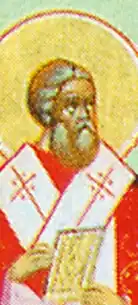Paul IV of Constantinople
Paul IV of Constantinople | |
|---|---|
 Patriarch Paul IV of Constantinople | |
| Ecumenical Patriarch of Constantinople | |
| Born | Cyprus |
| Died | December 784 Constantinople |
| Venerated in | Eastern Orthodox Church, Catholic Church |
| Feast | 30 August |
Paul IV of Constantinople | |
|---|---|
| Ecumenical Patriarch of Constantinople | |
| Installed | 20 February 780 |
| Term ended | 31 August 784 |
| Predecessor | Nicetas I of Constantinople |
| Successor | Tarasios of Constantinople |
| Personal details | |
| Died | December 784 |
| Denomination | Chalcedonian Christianity |
Paul IV of Constantinople, known as Paul the New (Greek: Παῦλος; died December 784), was Ecumenical Patriarch of Constantinople from 780 to 784.[1] He had once opposed the veneration of icons but urged the calling of an ecumenical council to address the iconoclast controversy. Later, he resigned and retired to a monastery due to old age and illness. He was succeeded by Tarasios of Constantinople,[2] who was a lay administrator at the time.
Paul IV is venerated as a saint in the Eastern Orthodox Church, and his feast day is celebrated on 30 August.
Notes and references
- ^ J. M. Hussey (1986), The Orthodox Church in the Byzantine Empire, Clarendon Press, Oxford.
- ^ St. Tarasius, "In 784 when Paul IV Patriarch of Constantinople died Tarasios was an imperial secretary and a champion of the veneration of images".